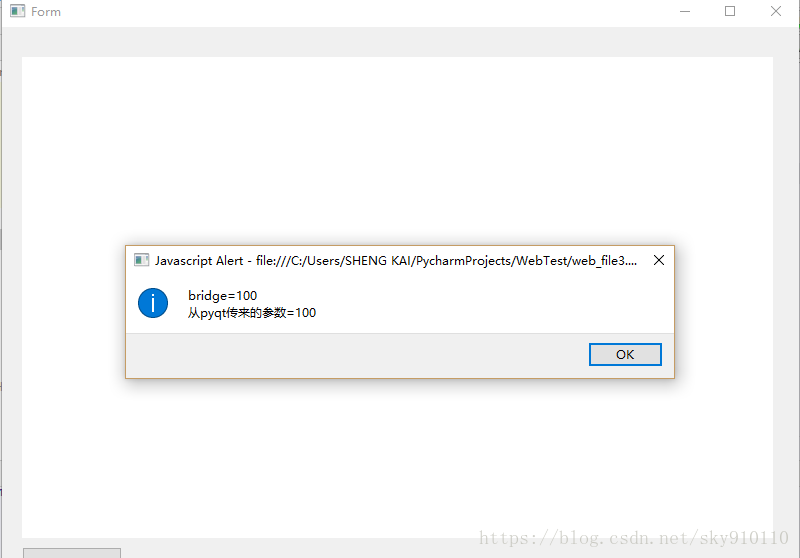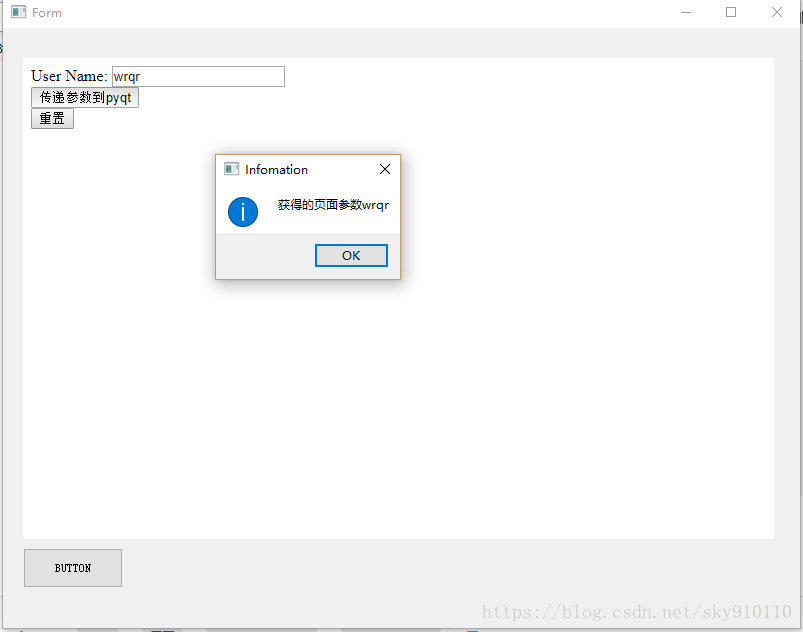您好,登录后才能下订单哦!
密码登录
登录注册
点击 登录注册 即表示同意《亿速云用户服务条款》
这篇文章主要介绍PyQt5中QWebEngineView内嵌网页与Python数据交互传参的示例分析,文中介绍的非常详细,具有一定的参考价值,感兴趣的小伙伴们一定要看完!
数据交互需要load进一个网页,这里我选择load进一个本地html网页:JSTest.html。
同时,QWebEngineView与外面的交互还需要Qt官方提供的一个js文件:qwebchannel.js,这个文件可以在网上下载。
JSTest.html和qwebchannel.js两个文件放在同一个目录下,我这边都是放在Python工程目录下。
qwebchannel.js:
/**************************************************************************** ** ** Copyright (C) 2016 The Qt Company Ltd. ** Contact: http://www.qt.io/licensing/ ** ** This file is part of the examples of the Qt Toolkit. ** ** $QT_BEGIN_LICENSE:BSD$ ** You may use this file under the terms of the BSD license as follows: ** ** "Redistribution and use in source and binary forms, with or without ** modification, are permitted provided that the following conditions are ** met: ** * Redistributions of source code must retain the above copyright ** notice, this list of conditions and the following disclaimer. ** * Redistributions in binary form must reproduce the above copyright ** notice, this list of conditions and the following disclaimer in ** the documentation and/or other materials provided with the ** distribution. ** * Neither the name of The Qt Company Ltd nor the names of its ** contributors may be used to endorse or promote products derived ** from this software without specific prior written permission. ** ** ** THIS SOFTWARE IS PROVIDED BY THE COPYRIGHT HOLDERS AND CONTRIBUTORS ** "AS IS" AND ANY EXPRESS OR IMPLIED WARRANTIES, INCLUDING, BUT NOT ** LIMITED TO, THE IMPLIED WARRANTIES OF MERCHANTABILITY AND FITNESS FOR ** A PARTICULAR PURPOSE ARE DISCLAIMED. IN NO EVENT SHALL THE COPYRIGHT ** OWNER OR CONTRIBUTORS BE LIABLE FOR ANY DIRECT, INDIRECT, INCIDENTAL, ** SPECIAL, EXEMPLARY, OR CONSEQUENTIAL DAMAGES (INCLUDING, BUT NOT ** LIMITED TO, PROCUREMENT OF SUBSTITUTE GOODS OR SERVICES; LOSS OF USE, ** DATA, OR PROFITS; OR BUSINESS INTERRUPTION) HOWEVER CAUSED AND ON ANY ** THEORY OF LIABILITY, WHETHER IN CONTRACT, STRICT LIABILITY, OR TORT ** (INCLUDING NEGLIGENCE OR OTHERWISE) ARISING IN ANY WAY OUT OF THE USE ** OF THIS SOFTWARE, EVEN IF ADVISED OF THE POSSIBILITY OF SUCH DAMAGE." ** ** $QT_END_LICENSE$ ** ****************************************************************************/ "use strict"; var QWebChannelMessageTypes = { signal: 1, propertyUpdate: 2, init: 3, idle: 4, debug: 5, invokeMethod: 6, connectToSignal: 7, disconnectFromSignal: 8, setProperty: 9, response: 10, }; var QWebChannel = function(transport, initCallback) { if (typeof transport !== "object" || typeof transport.send !== "function") { console.error("The QWebChannel expects a transport object with a send function and onmessage callback property." + " Given is: transport: " + typeof(transport) + ", transport.send: " + typeof(transport.send)); return; } var channel = this; this.transport = transport; this.send = function(data) { if (typeof(data) !== "string") { data = JSON.stringify(data); } channel.transport.send(data); } this.transport.onmessage = function(message) { var data = message.data; if (typeof data === "string") { data = JSON.parse(data); } switch (data.type) { case QWebChannelMessageTypes.signal: channel.handleSignal(data); break; case QWebChannelMessageTypes.response: channel.handleResponse(data); break; case QWebChannelMessageTypes.propertyUpdate: channel.handlePropertyUpdate(data); break; default: console.error("invalid message received:", message.data); break; } } this.execCallbacks = {}; this.execId = 0; this.exec = function(data, callback) { if (!callback) { // if no callback is given, send directly channel.send(data); return; } if (channel.execId === Number.MAX_VALUE) { // wrap channel.execId = Number.MIN_VALUE; } if (data.hasOwnProperty("id")) { console.error("Cannot exec message with property id: " + JSON.stringify(data)); return; } data.id = channel.execId++; channel.execCallbacks[data.id] = callback; channel.send(data); }; this.objects = {}; this.handleSignal = function(message) { var object = channel.objects[message.object]; if (object) { object.signalEmitted(message.signal, message.args); } else { console.warn("Unhandled signal: " + message.object + "::" + message.signal); } } this.handleResponse = function(message) { if (!message.hasOwnProperty("id")) { console.error("Invalid response message received: ", JSON.stringify(message)); return; } channel.execCallbacks[message.id](message.data); delete channel.execCallbacks[message.id]; } this.handlePropertyUpdate = function(message) { for (var i in message.data) { var data = message.data[i]; var object = channel.objects[data.object]; if (object) { object.propertyUpdate(data.signals, data.properties); } else { console.warn("Unhandled property update: " + data.object + "::" + data.signal); } } channel.exec({type: QWebChannelMessageTypes.idle}); } this.debug = function(message) { channel.send({type: QWebChannelMessageTypes.debug, data: message}); }; channel.exec({type: QWebChannelMessageTypes.init}, function(data) { for (var objectName in data) { var object = new QObject(objectName, data[objectName], channel); } // now unwrap properties, which might reference other registered objects for (var objectName in channel.objects) { channel.objects[objectName].unwrapProperties(); } if (initCallback) { initCallback(channel); } channel.exec({type: QWebChannelMessageTypes.idle}); }); }; function QObject(name, data, webChannel) { this.__id__ = name; webChannel.objects[name] = this; // List of callbacks that get invoked upon signal emission this.__objectSignals__ = {}; // Cache of all properties, updated when a notify signal is emitted this.__propertyCache__ = {}; var object = this; // ---------------------------------------------------------------------- this.unwrapQObject = function(response) { if (response instanceof Array) { // support list of objects var ret = new Array(response.length); for (var i = 0; i < response.length; ++i) { ret[i] = object.unwrapQObject(response[i]); } return ret; } if (!response || !response["__QObject*__"] || response.id === undefined) { return response; } var objectId = response.id; if (webChannel.objects[objectId]) return webChannel.objects[objectId]; if (!response.data) { console.error("Cannot unwrap unknown QObject " + objectId + " without data."); return; } var qObject = new QObject( objectId, response.data, webChannel ); qObject.destroyed.connect(function() { if (webChannel.objects[objectId] === qObject) { delete webChannel.objects[objectId]; // reset the now deleted QObject to an empty {} object // just assigning {} though would not have the desired effect, but the // below also ensures all external references will see the empty map // NOTE: this detour is necessary to workaround QTBUG-40021 var propertyNames = []; for (var propertyName in qObject) { propertyNames.push(propertyName); } for (var idx in propertyNames) { delete qObject[propertyNames[idx]]; } } }); // here we are already initialized, and thus must directly unwrap the properties qObject.unwrapProperties(); return qObject; } this.unwrapProperties = function() { for (var propertyIdx in object.__propertyCache__) { object.__propertyCache__[propertyIdx] = object.unwrapQObject(object.__propertyCache__[propertyIdx]); } } function addSignal(signalData, isPropertyNotifySignal) { var signalName = signalData[0]; var signalIndex = signalData[1]; object[signalName] = { connect: function(callback) { if (typeof(callback) !== "function") { console.error("Bad callback given to connect to signal " + signalName); return; } object.__objectSignals__[signalIndex] = object.__objectSignals__[signalIndex] || []; object.__objectSignals__[signalIndex].push(callback); if (!isPropertyNotifySignal && signalName !== "destroyed") { // only required for "pure" signals, handled separately for properties in propertyUpdate // also note that we always get notified about the destroyed signal webChannel.exec({ type: QWebChannelMessageTypes.connectToSignal, object: object.__id__, signal: signalIndex }); } }, disconnect: function(callback) { if (typeof(callback) !== "function") { console.error("Bad callback given to disconnect from signal " + signalName); return; } object.__objectSignals__[signalIndex] = object.__objectSignals__[signalIndex] || []; var idx = object.__objectSignals__[signalIndex].indexOf(callback); if (idx === -1) { console.error("Cannot find connection of signal " + signalName + " to " + callback.name); return; } object.__objectSignals__[signalIndex].splice(idx, 1); if (!isPropertyNotifySignal && object.__objectSignals__[signalIndex].length === 0) { // only required for "pure" signals, handled separately for properties in propertyUpdate webChannel.exec({ type: QWebChannelMessageTypes.disconnectFromSignal, object: object.__id__, signal: signalIndex }); } } }; } /** * Invokes all callbacks for the given signalname. Also works for property notify callbacks. */ function invokeSignalCallbacks(signalName, signalArgs) { var connections = object.__objectSignals__[signalName]; if (connections) { connections.forEach(function(callback) { callback.apply(callback, signalArgs); }); } } this.propertyUpdate = function(signals, propertyMap) { // update property cache for (var propertyIndex in propertyMap) { var propertyValue = propertyMap[propertyIndex]; object.__propertyCache__[propertyIndex] = propertyValue; } for (var signalName in signals) { // Invoke all callbacks, as signalEmitted() does not. This ensures the // property cache is updated before the callbacks are invoked. invokeSignalCallbacks(signalName, signals[signalName]); } } this.signalEmitted = function(signalName, signalArgs) { invokeSignalCallbacks(signalName, signalArgs); } function addMethod(methodData) { var methodName = methodData[0]; var methodIdx = methodData[1]; object[methodName] = function() { var args = []; var callback; for (var i = 0; i < arguments.length; ++i) { if (typeof arguments[i] === "function") callback = arguments[i]; else args.push(arguments[i]); } webChannel.exec({ "type": QWebChannelMessageTypes.invokeMethod, "object": object.__id__, "method": methodIdx, "args": args }, function(response) { if (response !== undefined) { var result = object.unwrapQObject(response); if (callback) { (callback)(result); } } }); }; } function bindGetterSetter(propertyInfo) { var propertyIndex = propertyInfo[0]; var propertyName = propertyInfo[1]; var notifySignalData = propertyInfo[2]; // initialize property cache with current value // NOTE: if this is an object, it is not directly unwrapped as it might // reference other QObject that we do not know yet object.__propertyCache__[propertyIndex] = propertyInfo[3]; if (notifySignalData) { if (notifySignalData[0] === 1) { // signal name is optimized away, reconstruct the actual name notifySignalData[0] = propertyName + "Changed"; } addSignal(notifySignalData, true); } Object.defineProperty(object, propertyName, { configurable: true, get: function () { var propertyValue = object.__propertyCache__[propertyIndex]; if (propertyValue === undefined) { // This shouldn't happen console.warn("Undefined value in property cache for property \"" + propertyName + "\" in object " + object.__id__); } return propertyValue; }, set: function(value) { if (value === undefined) { console.warn("Property setter for " + propertyName + " called with undefined value!"); return; } object.__propertyCache__[propertyIndex] = value; webChannel.exec({ "type": QWebChannelMessageTypes.setProperty, "object": object.__id__, "property": propertyIndex, "value": value }); } }); } // ---------------------------------------------------------------------- data.methods.forEach(addMethod); data.properties.forEach(bindGetterSetter); data.signals.forEach(function(signal) { addSignal(signal, false); }); for (var name in data.enums) { object[name] = data.enums[name]; } } //required for use with nodejs if (typeof module === 'object') { module.exports = { QWebChannel: QWebChannel }; }
Python主函数代码
import sys
import Web_UI
from PyQt5 import QtCore, QtGui, QtWidgets
from PyQt5.QtCore import QObject,pyqtProperty
from PyQt5.QtWebChannel import QWebChannel
from MySharedObject import MySharedObject
from PyQt5.QtWidgets import QApplication
import os
BASE_DIR = os.path.dirname(__file__)#获取当前文件夹的绝对路径
if __name__ == '__main__':
app = QtWidgets.QApplication(sys.argv)
MainWindow = QtWidgets.QFrame()
ui = Web_UI.Ui_Form()
ui.setupUi(MainWindow)
ui.webView1.load(QtCore.QUrl(r""+BASE_DIR+"/JSTest.html"))
channel = QWebChannel() ##创建一个QwebChannel对象,用于传递PyQt的参数到JavaScript
myObj = MySharedObject()
print(myObj.strval)
channel.registerObject('bridge', myObj)
ui.webView1.page().setWebChannel(channel)
MainWindow.show()
sys.exit(app.exec_())继承了QWidget类的MySharedObject(Python文件)
from PyQt5.QtCore import QObject
from PyQt5.QtCore import pyqtProperty
from PyQt5.QtWidgets import QWidget,QMessageBox
class MySharedObject(QWidget):
def __init__(self,strval = '100'):
super(MySharedObject,self).__init__()
self.strval = strval
def _getStrValue(self):
return self.strval
def _setStrValue(self,str):
self.strval = str
print('获得页面参数:%s'% str)
QMessageBox.information(self,"Infomation", '获得的页面参数%s' % str)
#需要定义的对外发布的方法
strValue= pyqtProperty(str,_getStrValue,_setStrValue)页面代码HTML
<!DOCTYPE html>
<html>
<head>
<meta charset="UTF-8">
<title>A Demo Page</title>
<script src = "qwebchannel.js"></script>
<script language = "javascript">
function completeAndReturnName(){
var fname = document.getElementById('fname').value;
var lname = document.getElementById('lname').value;
var fullname = fname +' '+ lname;
document.getElementById('fullname').value = fullname;
document.getElementById('submit-btn').style.display = 'block';
return fullname;
}
document.addEventListener("DOMContentLoaded",function(){
new QWebChannel(qt.webChannelTransport, function (channel) {
//alert('111 chanel='+channel)
window.bridge = channel.objects.bridge;
alert('bridge='+bridge.strValue +'\n从pyqt传来的参数='+window.bridge.strValue);
//alert('111 chanel='+ channel.objects.strValue)
})
} )
function onShowMsgBox() {
if(window.bridge != null){
var fname = document.getElementById('fname').value;
window.bridge.strValue = fname; //调用对象
}
}
</script>
</head>
<body>
<form>
<label id = "name">User Name:</label>
<input type = "text" name = "fname" id = "fname"></input>
<br />
<input type = "button" value="传递参数到pyqt" οnclick="onShowMsgBox()"></input>
<br />
<input type = "reset" value="重置"></input>
</form>
</body>
</html>实现效果


以上是“PyQt5中QWebEngineView内嵌网页与Python数据交互传参的示例分析”这篇文章的所有内容,感谢各位的阅读!希望分享的内容对大家有帮助,更多相关知识,欢迎关注亿速云行业资讯频道!
免责声明:本站发布的内容(图片、视频和文字)以原创、转载和分享为主,文章观点不代表本网站立场,如果涉及侵权请联系站长邮箱:is@yisu.com进行举报,并提供相关证据,一经查实,将立刻删除涉嫌侵权内容。